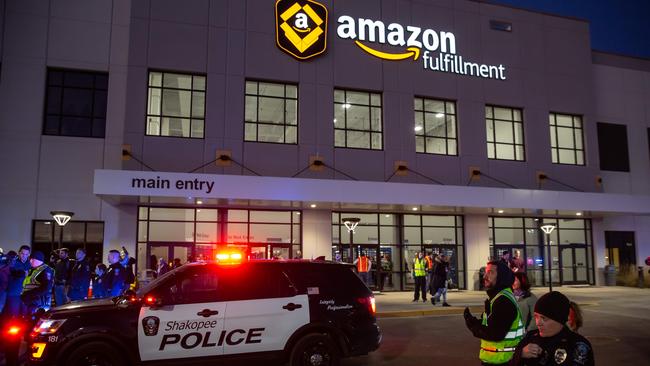Amazon suspends police use of facial recognition tech
The tech giant has joined a growing chorus of companies and activists calling for greater regulation amid concerns of racial bias.

Amazon said it is halting law-enforcement use of its facial-recognition software, adding its voice to a growing chorus of companies, politicians and civil rights advocates calling for greater regulation of the surveillance technology amid widespread concern about its potential for racial bias.
“We hope this one-year moratorium might give Congress enough time to implement appropriate rules, and we stand ready to help if requested,” Amazon said in a blog post Wednesday. The retailing giant said it has been advocating for strong government regulation of the use of facial-recognition technology, and Congress appeared ready to take on that challenge.
Police tactics and law enforcement’s use of technology has come under increasing scrutiny with the wave of nationwide protests triggered by the police killing of George Floyd.
A police reform bill House Democrats introduced Monday would prohibit federal law enforcement’s use of real-time facial recognition.
Some activists said the provision didn’t go far enough. Neema Guliani, senior legislative counsel at the American Civil Liberties Union, said legislation should prohibit all use of facial recognition on police body-camera footage, and called for restrictions on federal funding for local law-enforcement agencies that don’t restrict its use in the same way.
Amazon has sold its Rekognition face-recognition software widely, including to police departments and other US enforcement agencies. The company said it would continue to allow the use of its tools by organisations that deploy facial recognition to combat human trafficking and find missing children.
IBM earlier this week said it had stopped developing and offering facial-recognition software following long-running criticism that such technologies are less accurate on African-American and other minorities’ faces than on caucasians.
IBM’s new chief executive, Arvind Krishna, notified Congress of the decision in a letter Monday, in which he also advocated for police reform and expanding educational support for people of colour following mass demonstrations against what activists and policy makers have denounced as institutionalised racism in American police forces.
“We believe now is the time to begin a national dialogue on whether and how facial recognition technology should be employed by domestic law enforcement agencies,” Mr Krishna wrote in the letter, addressed to five Democratic members of Congress, four of them African-Americans. “Artificial Intelligence is a powerful tool that can help law enforcement keep citizens safe. But vendors and users of Al systems have a shared responsibility to ensure that Al is tested for bias, particularity when used in law enforcement, and that such bias testing is audited and reported.”
Facial recognition’s accuracy has improved dramatically in recent years, due to advancements in algorithms and ever-faster computers. But with the growing utility of the technology — which has become ubiquitous as a means of unlocking smartphones and making digital payments — academic researchers and activists have raised alarms about embedded racial and gender biases.
In a landmark study two years ago, Massachusetts Institute of Technology researchers found significant differences in the accuracy of facial-recognition systems, including IBM’s, depending on sex and skin tone. Later academic work backed up the existence of biases, including a major government-funded study in December.
Tech companies have carved out different stances on how to handle their facial-recognition tools. Amazon, which has defended its Rekognition product against charges of bias, had continued to offer it to law enforcement.
Microsoft, another major facial-recognition vendor, has said it is handling the technology cautiously. President Brad Smith last year said the company declined to sell it to a police department in California over concerns it would be used in mass surveillance.
The Wall Street Journal



To join the conversation, please log in. Don't have an account? Register
Join the conversation, you are commenting as Logout